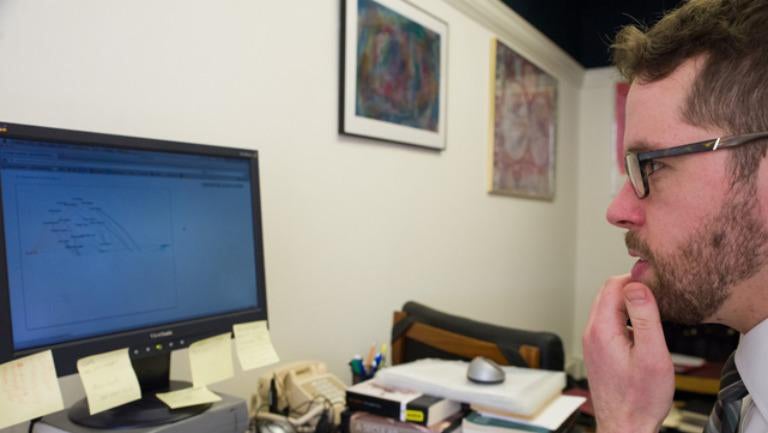Title: ‘Facebook’ for Early Modern Lit Finds Relationships Among Authors
Six Degrees of Francis Bacon, a kind of Facebook mapping the British early modern social network, is the brainchild of Georgetown English professor Daniel Shore and scholars at Carnegie Mellon University.

For nearly a year, early modern literature and history nerds have had their own Facebook (minus the faces) that instantly links relationships among 16th and 17th-century authors, politicians, kings, queens, theologians and other luminaries of the period.
Six Degrees of Francis Bacon, which recently received a grant from the National Endowment for the Humanities (NEH), is a digital project established by Georgetown and Carnegie Mellon University (CMU) that recreates the British early modern social network.
Georgetown English professor Daniel Shore worked with Georgetown alumnus Christopher Warren (G’03)and Jessica Otis at CMU to map the network by mining 62 million words in the Oxford Dictionary of National Biography.
No Kitten Videos
Like Facebook, you enter a name such as William Shakespeareina space on the website and up pops that person and all his or her “friends.”
But since this is serious scholarship,there are no selfies or videos of kittens attacking balls of yarn.
“Six Degrees is, naturally, aimed at academics, scholars of the literature and historians of the period,” Shore says, “but also we have quite a few of what we call citizen scholars, who are, for example, interested in the court of Henry VIII and are able to take advantage of our site and contribute knowledge.”
The site, which includes exercises and syllabi to get students involved, is already being used in classrooms at both universities.
New Funding
Earlier this month the Six Degrees received an NEH Digital Implementation Grant that Shore says will “transform the site into a sustainable and vital resource to grow and serve the early modern community for the long term.”
The grant, he adds, will also allow for packaging and distribution of network so that scholars can create similar systems for different eras and regions.
Shore and Warren serve as co-principal investigators on the NEH grant as well as on grants from Google and the Council on Library and Information Resources.
Who Knows Whom
Shore calls Six Degrees is an “excellent way” to get students to play close attention to such figures in the distant past and view their connections to one another.
“We don’t have beliefs in a vacuum, we don’t write about one topic or another without the way we’re positioned in society shaping our views, shaping our understanding of the world,” notes Shore, an expert on Paradise Lost author John Milton.
“So our relationships are not just a matter of who knew whom,” he adds. “They matter to our ideas, and the ways we make art. The kinds of contributions people made to the world depended very much on the views of the people with whom they were connected.”
Wider Possibilities
The site currently identifies more than 15,000 individuals and highlights approximately 200,000 relationships.
Shore says scholars can make connections on Six Degrees that would be “very hard to do” by combing through archived biographies in a library.
“Milton didn’t directly know George Fox, the central figure of England’s Quaker movement, but we can find that his shared network includes Fox,” he explains. “The amount of legwork you would have to do to figure that out would be extremely tedious with printed documents, but you can search for those kinds of connections on Six Degrees of Francis Bacon in seconds.”
Shore also says the site gives researchers a wider set of possibilities for thinking about someone’s social position.
“It can give you a set of hypotheses to speculate about, such as – was Milton closely connected to continental education reformers, or to Quakerism or to other religious radicals?” he says.
Intuitive Knowledge
The project began when Shore and Warren, a CMU English professor, were talking over drinks in a bar during a Modern Language Association convention.
“We were discussing how experts in early modern literature over decades of experience gain knowledge of the way people in the period were related to each other,” the Georgetown professor notes. “We talked about how you have to spend a career getting that knowledge and that there must be a better way to share it.”
A lot of this knowledge hasn’t been shared, he says, because scholars only talk about the relationships that directly matter to their arguments.
“Chris and I thought about how we could essentially create something like a Facebook for the 16th and 17th centuries,” Shore notes, “both as a resource for people to consult and as something to which they could contribute their ongoing research into the period.”
Those Six Degrees
The name of the project was chosen for its connection to the popular parlor game, Six Degrees of Kevin Bacon, which, like the 1990 play Six Degrees of Separation by Georgetown alumnus John Guare (C’60), is based on hypotheses created by social scientists and mathematicians in the early and mid-20th century.
“As we see in today’s society as well, it doesn’t just matter who you know, it matters who you know knows as well,” Shore says. “Social scientists are discovering this more and more – that you learn a lot about peoples’ place in society, the role that they play, not just by their friends, but by the way those friends are connected up to the larger network.”